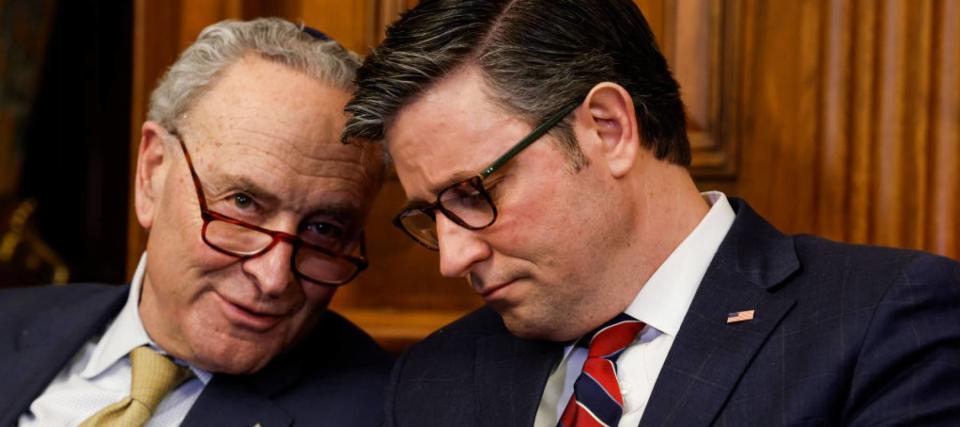
We could witness the demise of capitalism in the U.S. in 2024 — according to the latest series of ‘Outrageous Predictions’ published by Danish investment bank Saxo.
This bold call — not an official bank forecast, but rather an unlikely event worth pondering — all boils down to America’s massive debt problem and the steps the government may take to get its beleaguered finances under control.
Don’t miss
Currently, Congress is hunkering down to negotiate spending bills and stopgap deals in order to avoid a partial government shutdown next week or a complete one on Feb. 2. Budget impasses like this one are not rare or particularly surprising. The U.S. federal government has shutdown over 20 times in the last five decades, per Axios. Lawmakers remain concerned about spending levels as the national debt grows past $34 trillion.
This precarious fiscal position the government finds itself in could force it to make a “dramatic move” this year that would mark “the end of capitalism” in the U.S., according to Althea Spinozzi, head of fixed income strategy at Saxo.
Tax-free government bonds
While recession fears have eased and experts are optimistic about a downward trajectory for inflation this year, Spinozzi paints a bleaker picture to explain her "outrageous" prediction.
She assumes a second wave of inflation in 2024 coincides with a need to expand fiscal spending amid the presidential elections. The additional spending will be required to keep the economy going, avoid social unrest, and bulk up the military as geopolitical tensions rise.
What happens next? The budget deficit, which was around 6% of GDP in the 2023 fiscal year, surges above 10% of the GDP. Stocks soar thanks to government support programs. With high inflation, interest rates would have to go up as well.
In such a scenario, the government would find borrowing extremely expensive. In order to fight inflation and bring down interest rates, it would need to sell more U.S. Treasuries to domestic investors at a time when stocks are more tempting.
Saxo analysts think that in a desperate attempt to "normalize borrowing costs," Congress would make capital gains and interest income from government bonds tax-free (income from T-bonds is currently only taxed at the federal level).
As a result, investors flock to bonds in order to lock in the highest yields in decades without the tax burden and the stock market collapses.
This strategy would spell the end of capitalism “as money rotates from private corporations to the public, and holding riskier assets becomes more expensive,” Spinozzi explained. "Despite the government's failure to resolve inequality, lower borrowing costs extinguish social unrest. What follows is a long period of nationalisation and government intervention in critical sectors that are struggling to attract capital."
Read more: Millions of Americans are in massive debt in the face of rising rates. Here's how to take a break from debt this month
Government-run economy
Chatting through this bizarre idea with Bloomberg’s Merryn Somerset Webb, Saxo chief investment officer Steen Jakobsen said: “People are putting question marks on the U.S. debt and its ability to be refinanced. In economics lingo, we have a stock problem, which is the size of the debt, and we have a flow problem, which is the ever-increasing new (Treasury bond) issuance that we see.”
If the federal government were to try and create additional demand for Treasury securities, Jakobsen said the capital going to the public sector would increase in size and scope and that would "take away money from the smaller, but far more appealing — at least to most investors — equity market.”
Jakobsen conceded that “a lot of people would actually argue we already killed capitalism.”
He told Somerset Webb the “hand of the government is just getting heavier and heavier” — singling out the growing role of “regulation, wokeness, ESG [and] all of the frameworks that sit outside the actual clearing of prices in the [stock] market.”
When Somerset Webb asked if the U.S. is getting close to having a “government-run economy,” Jakobsen responded: “Exactly!” And he said that wouldn’t be in retail investors’ favor.
“We know that the government sector — both in GDP terms, but also in absolute productivity terms — is far less efficient than the private market,” he said.
What to read next
This article provides information only and should not be construed as advice. It is provided without warranty of any kind.
"come" - Google News
January 14, 2024 at 07:30PM
https://ift.tt/4mCJxuX
'We already killed capitalism': Will this 'outrageous' prediction come true for the US economy in 2024? - Yahoo Finance
"come" - Google News
https://ift.tt/Sl5FPvk
Shoes Man Tutorial
Pos News Update
Meme Update
Korean Entertainment News
Japan News Update
Bagikan Berita Ini














0 Response to "'We already killed capitalism': Will this 'outrageous' prediction come true for the US economy in 2024? - Yahoo Finance"
Post a Comment